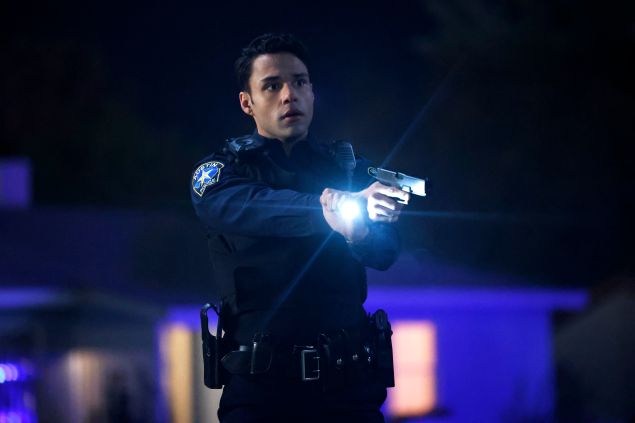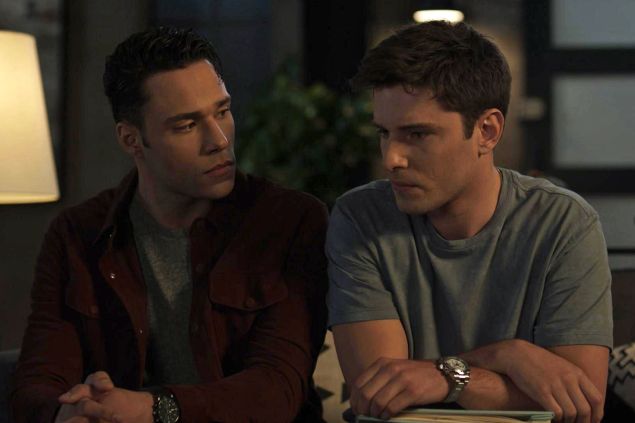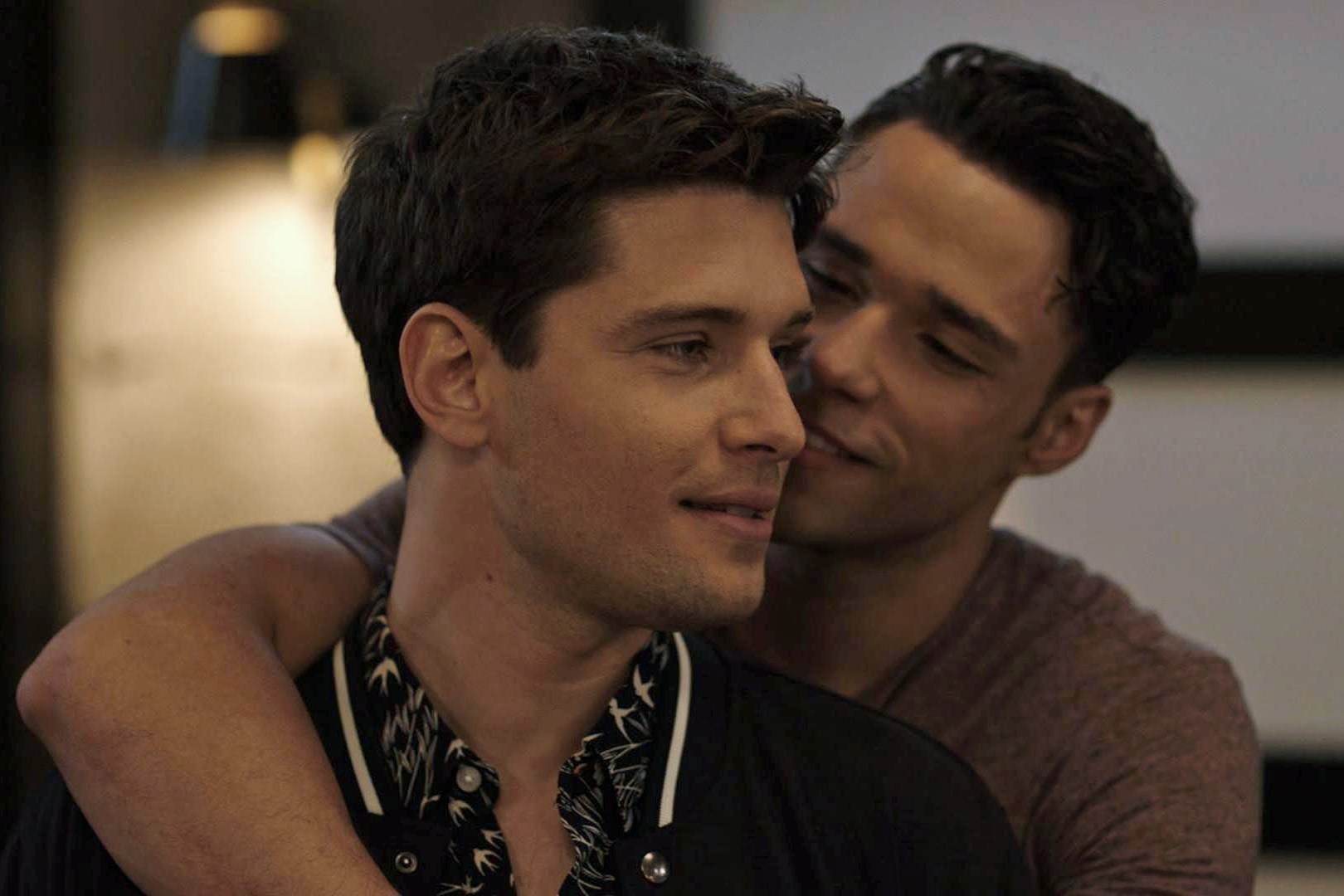This article contains spoilers for Monday’s “Riddle of the Sphynx†episode of 9-1-1: Lone Star.
After he and his boyfriend Carlos (Rafael Silva) were drugged by Sadie (Julie Benz)—the deranged former neighbor of his father, Owen (Rob Lowe)—T.K. (Ronen Rubinstein) found that his two years of sobriety had been taken away from him. So he took it upon himself to ensure that he would not suffer a relapse, going 90 Alcoholics Anonymous meetings in as many days. And he took a special liking to Cooper, a former addict who is committed to helping others in the community stay sober—so much so that T.K. asked him to be his first sponsor since moving from New York to Austin.
But after waking up one night to the sound of T.K. chatting away on the phone with Cooper, Carlos—who has consistently reiterated his desire to support T.K.’s sobriety—can’t shake the feeling that T.K. has chosen to exclude him from an important part of his life, which is exacerbated when he unexpectedly meets his boyfriend’s sponsor before one of their AA meetings. When Carlos lashes out later that night, explaining that he “feels like [Cooper]’s getting parts of you that I don’t,†T.K. responds without missing a beat: “Because you haven’t been there—and thank God you haven’t. I need people in my life that have, and if that means that sometimes I’m late getting home, just know it’s only so I will get home, Carlos.â€
“This is the first time that we address Carlos’ relationship with not only T.K. but [also] T.K.’s sobriety,†Silva told Observer. “Carlos can choose to be there for T.K., but it has to be of T.K.’s own accord. He doesn’t know what it means to be addicted to certain substances, to go through withdrawal, so this is a world that Carlos has no idea how to maneuver through. And that confuses him and probably pisses him off, and he feels isolated, because Carlos likes to control, he likes to maintain order, and that’s where he gains a sense of self as well. So what happens when he can’t do any of those things? That’s the story that we were telling in this episode.â€
In a recent Zoom interview, Silva spoke about the continued evolution of the “Tarlos†relationship that has become a cornerstone of the 9-1-1 franchise, his reaction to the couple’s initial break-up (and emotional reunion) earlier this season, and the importance of telling a queer love story at a time when anti-LGBTQ+ legislation continues to be passed around the country in states like Florida and Texas.
Carlos’ love language seems to be acts of service, like making dinner, and at the end of the episode, he recognizes that T.K. really needs to talk to Cooper, so he invites Cooper over for dinner and leaves the loft to give them privacy. Why was it important to show that Carlos was still willing to be there for T.K., even if it was in a more emotional than physical capacity this time around?
Rafael Silva: Well, first, I think that’s correct. Carlos’ love language is acts of service. He’s a first responder, [so] the way that he lives his life is by putting his own life at risk or putting himself on the line for the safety of the community. I think that acts of service are more or less in line with how Carlos expresses himself. There is that scene when T.K. is looking through the albums and Carlos is left by himself when T.K. gets up, and I think that moment is [when] Carlos realizes, “Oh, it doesn’t matter how much I want to help T.K. This is not about me; this is about T.K.â€
I think that realization brings Carlos to this moment of [realizing] love is also selflessness. Love, at its core, is to love someone not the way that you see it best, but the way that they need it best. So in that moment, Carlos couldn’t be the voice to assist T.K. Only Cooper could, because there is that unspoken bond of going through something that another person has as well and that someone who has never been in that position will never know. So it’s [an] act of service, it’s selflessness, it’s love, and Carlos is learning what those love languages are as well.

At the start of the season, T.K. and Carlos got back together after breaking up over a disagreement about the loft that they now share. What did you make of that storyline, and what was it like for you to shoot the fourth episode, in which Carlos delivers a monologue while T.K. is in a coma?
That’s a great question. I think I was informed that we were gonna be broken up before we started shooting. And then, as the scripts started coming in—and we’re shooting everything at the same time so we were going back and forth between the timelines—I just got so fucking angry. I got so angry at, first of all, the break up and then how [the break-up] started to reveal itself. So I called [co-showrunner] Tim Minear, and I was like, “Can I talk to you for a hot second?†[Laughs.] And he was like, “Yeah, absolutely.†I was like, “Tim . . . I’m angry. I’m very angry for Carlos. I’m not angry as an actor, but I’m just angry as a character [about] the reason [for the break-up] and the storyline of Carlos buying the loft and T.K. just walking out.†So when I found that out, Tim had not yet written that monologue in the hospital, or all of those scenes in the hospital where Carlos is like, “I don’t understand. I’m so angry, but I love him so much.â€
I think we were shooting episode 1 or episode 2, and I told him, “Tim, we cannot let Carlos’ anger go unnoticed. We cannot, because then we’re diminishing all of it, we’re creating a one-dimensional character. No, this is a man [who] has feelings, and there is only a certain point where he’s going to put himself on the line.†He’s been shut down over and over again by T.K., and he keeps going back, because he believes in T.K.—or whatever Carlos’ reason is. But I was like, “You cannot let this anger go because, first of all, it’s very important to show anger. Anger is just pain that came from a love that was lost, so we need to feel that loss, we need to see Carlos’ pain.†It wasn’t necessarily about anger [or] pain. Once again, it was just [due to the] love that Carlos feels for T.K.
There’s a lot of freedom in the solitude of this vulnerability [in that moment], because it’s just him looking at T.K. with no one else in the room, and this is the moment where Carlos can shed everything and just be real. He was cold with T.K. in the field, he was awkward, but [in that scene], he’s like, “I love you, but you fucked up. And yet I’m here, God damn it. That’s how much I love you.†And actually, part of the monologue was cut off at the end. I think he says, “I forgive you for leaving. But if you leave me, I will never forgive you.†That was cut out because that last part wouldn’t really make sense with the rest of the story, but it was a beautiful line that I think spoke truly to Carlos’ heart: “I forgive you for leaving—that’s why I’m here—but if you leave me right now, then I’m definitely not enough for you.â€
Carlos has always been quick to put the blame on himself when something goes wrong, even in situations that are out of his control, such as the house fire last season and the ill-fated plane ride earlier this season. Why do you think he has this tendency to blame himself, and how do you think that might be tied to his upbringing or who he is as a person?
As Rafael, I just want to raise the stakes of whatever story that we’re telling, just so that it’s interesting but also just trying to do justice to Tim’s writing. But for Carlos, I can’t really answer that. I can justify it as an actor, but what I would be interested in seeing is where that character trait comes from [in] almost like a “Carlos Begins†episode. I’m not saying I want that episode but . . . I want that episode. [Laughs.] But when we eventually get to the storyline where we might explain Carlos’ story to a fuller extent, we can see where those traits were birthed. It could have been through a situation, a relationship with somebody.
It also just makes that story more interesting. Everything can happen in an instant as a police officer, and especially over the past two years, we’ve been laser focused on police enforcement here in the United States, and it’s a profession that deals with high stakes all the time. So even as a character wanting to keep things together or just trying to de-escalate the situation all the time, I think that it’s almost like Carlos’ nature—it’s not [even] second nature. It could be explained with this job, but I think it would also be fun to see moments in his life where that kind of incessant insecurity just comes in and tries to control and make sense of everything.
How much do you actually know about Carlos’ backstory? Is that something that you have discussed with Tim, or do you just learn little details as you go that inform your choices as an actor?
That’s a great question. This is a conversation that one needs to have with the showrunner, the head writer, so you can also express yourself and be like, “Hey, why is my character doing this?†So then you can align with the things that you have in your head, but you also learn about the character, especially with this episode. Here’s Carlos who is so ready to love and be there for T.K., and at the same time, he’s—through no fault of his own—making T.K.’s sobriety about him. He’s like, “How come you don’t love me?†T.K. is like, “Well, it’s not about me not loving you—you’re not the right person.†And Carlos says, “Oh, you mean I’m not enough?†Like, Carlos, dude, come on . . . [Sighs.]
But it’s beautiful because the character needs to go through these things, so we can see the growth. Carlos is great, he’s lovable, but he’s gonna make mistakes—and he should make mistakes. I see people on Twitter talk about, like, “Why can’t these characters just go through one day without suffering or without any struggles?†And I’m like, “Well, if they don’t struggle, then you don’t have a show. How about that?†Life is not dandy. Life is hard, but it can be fun as well. But you need those moments of struggle, so you can have [the resolution] really feel like a moment of joy, love and success.
Throughout the season, there have been numerous allusions to Carlos’ potential feature as a detective—even Sgt. Athena Grant-Nash (Angela Bassett) felt he would be a natural fit in the recent crossover. How do you feel about Carlos potentially becoming a detective or a Texas Ranger one day? Is he ready to go down that path, or do you think he’s happy where he is at the moment?
I don’t think Carlos is ever happy. [Laughs.] I think he always strives to be the best of himself, but he also gets in his own way. Carlos is young and the potential is there, but he needs to go through more things just as a police officer and [attain] a certain level of maturity. We need to see Carlos in different situations in order to become a detective, and there also needs to be other sorts of storylines that need Carlos to have a personal bond with becoming a detective. Sure, you can be a detective, but logistically, how would Carlos become part of the 126? At the end of the day, this is a show about first responders—firefighters, medics and then there’s Carlos and dispatch Grace (Sierra McClain), the two lone stars. [Laughs.]
I think this show needs to mature [to the point] where, [when] we get to storylines where there is the presence of a detective and that detective happens to be Carlos, it has to be justified. We’re not there yet, but it would be fun to see Carlos ride a horse and be a Texas Ranger or whatever, and just explore more of the Texan lifestyle. Texas [has a] very cowboy culture, it’s Tejano, it’s Latine, it’s very diverse, and it’s fun, so we need to explore more of that.

It seems like only a matter of time until Carlos and T.K. will get engaged, and I’m sure this has crossed your mind every once in a while: Who do you think would propose first? Or would it be one of those situations in which they end up proposing at the same time?
Oh my God. When I think about two people proposing at the same time, it’s beautiful, and I think it’s a great moment of genuine affection, but it robs us of witnessing somebody else feel vulnerable and surprised. And both people are in the vulnerable position—the one that’s proposing and the one receiving the proposal. I think it would be more fun to see one of them propose. At this point, after episode 13, I could say either of them could to be honest. I think it would be a great moment for T.K. to revisit a past trauma that he’s had, which is proposing and being rejected, and then also Carlos putting literally everything on the line and revisiting that moment in which he bought the freaking apartment and the guy walked out, so I think that there are high stakes for both of them.
When the time comes, would you want to see them raise a family together?
Yeah, I definitely see it happening. I want it to happen, if I do say so myself. I think it’s important to portray not [just] a gay family, not a family with two men and one child. . . . No, it’s just a family that happens to consist of these members who are all just humans, and then they happen to be two men, and it happens to be a child or two children—and especially now with all these anti-LGBTQ+ bills that are trying to be passed. At the end of the day, if you take away all these ignorant labels being placed on the LGBTQIA+ community, you’re targeting children. The majority of these malicious, white, cisgender men are targeting children [by] giving unscientific reasons. It’s horrific. So to have that sort of imagery on network TV that is extremely accessible and may appear in households that don’t often get to encounter members of our community, to see that on their TV is extremely powerful. It’s the start of a conversation—if not with other members of that family, but with oneself. That breaks away any sort of norm that we’re trying to create and all these myths that families are [only] supposed to [look like] this, marriages are supposed to be this. Like, no, this is all a lie. So it’s extremely powerful and I think we should add it [in the show].
This interview has been edited and condensed for length and clarity.
9-1-1: Lone Star airs Mondays at 9 p.m. on FOX.

